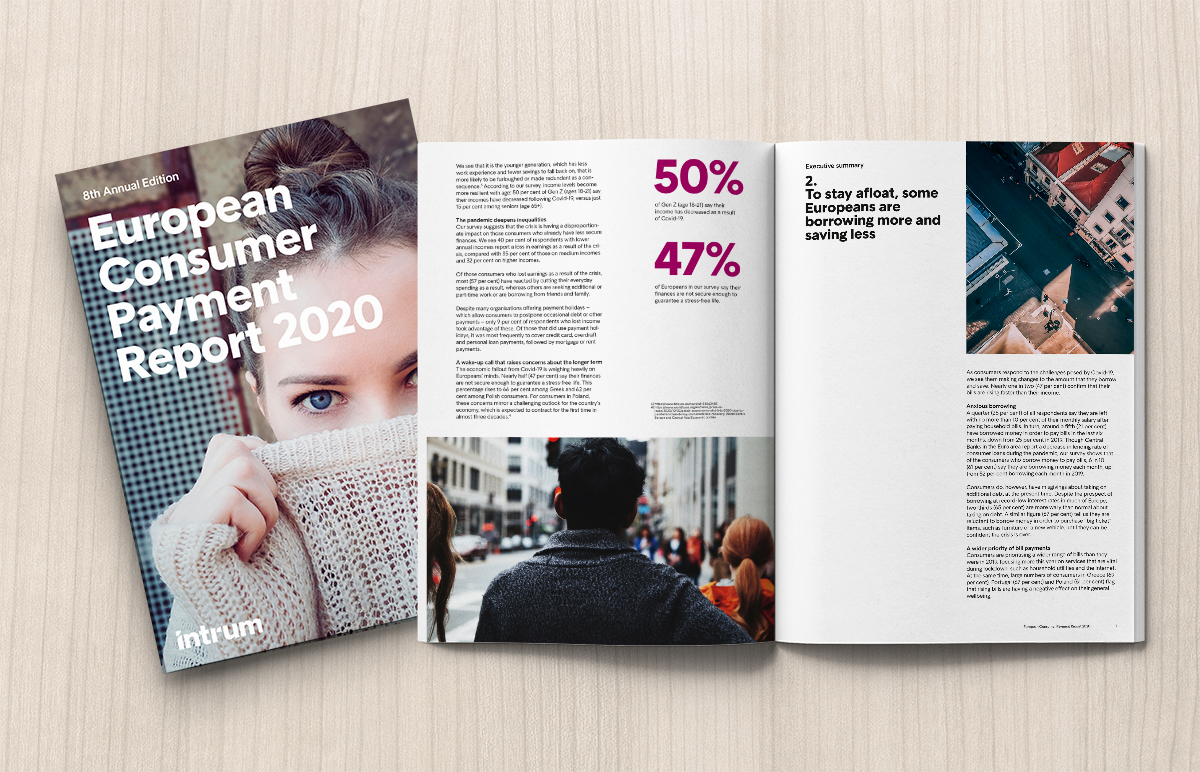A word from the CEO: The new reality
President and CEO Anders Engdahl shares his reflections of the results from our newly launched European Consumer Payment Report 2020.

In the 12 months since our last European Consumer Payment Report, the world has become a remarkably different place.
The second wave of the Covid-19 pandemic has led to new lockdowns. Across Europe, companies and consumers are under growing pressure. As the world struggles to control the immediate health crisis, households and businesses are feeling the economic side effects of the pandemic.
It is perhaps no surprise to learn that an event on the scale of Covid-19 has had a significant impact on consumer finances, but our analysis reveals a picture that is also more nuanced and perhaps less pessimistic than at first glance.
Three trends stand out.
1. Consumers experience a marked decline in their financial wellbeing
In 2019, we reported that European consumers were increasingly feeling the effects of financial stress. This year, around half of the 24,000 respondents to our survey say they have never before felt as anxious about their financial wellbeing as they do today (47 per cent). Correspondingly, a little over one in three (35 per cent) tell us they have lost income as a direct result of the crisis.
These are worrying developments, made more complicated by what we saw this spring: the impact of the pandemic has been most severe for “vulnerable” consumer groups, such as young adults with less savings to fall back on, parents with additional family-related expenses, and those with low income who are already on strict budgets. Additionally, our survey confirms the continued negative impact of the pandemic on already at-risk economies in Southern Europe.
It is perhaps no surprise to learn that an event on the scale of Covid-19 has had a significant impact on consumer finances, but our analysis reveals a picture that is also more nuanced and perhaps less pessimistic than at first glance.Anders Engdahl, President & CEO
2. Some Europeans are borrowing more and saving less
Many consumers can manage a drop in income by cutting down on nice-to-have items or by relying on their savings, but we also see an increase in borrowing among certain consumer groups to make ends meet. Though Central Banks in the Euro area report a decrease in the overall lending rate of consumer loans during the pandemic, our survey shows that two in three (61 per cent) of the consumers who borrow money to pay bills are borrowing money each month, up from 52 per cent borrowing each month in 2019.
At the same time, some are finding it difficult to save money. Although overall savings rates increased in Europe as a result of the pandemic, this has largely been driven by savings among higher income households, who are more likely to have kept their jobs and level of income whilst reducing consumption. In our survey, we see an increase in the proportion of people saving because they are worried about losing their job, while a third of respondents (34 per cent) overall admit that they are saving less money now than they were before the crisis began.
3. Economic uncertainty is driving new interest in financial literacy
One of the more positive developments in 2020 is our finding that European consumers are making a clear effort to deepen their financial understanding and attain greater control of their personal finances.
Four in ten say they are taking steps to improve their financial literacy, which could help them achieve a balanced and a more stress-free life. Considering the immediate impact of the Covid-19 crisis, and its unknown longer-term implications, investing in improving or refreshing knowledge of key financial terms and concepts would likely be worthwhile.
We believe financial skills, along with a strong local economy, will be an important factor in helping consumers to meet the challenges posed by the Covid-19 pandemic.Anders Engdahl, President & CEO
Waking up to the new reality
We believe financial skills, along with a strong local economy, will be an important factor in helping consumers to meet the challenges posed by the Covid-19 pandemic. As we discuss in this report, the ongoing crisis reinforces the need for realistic financial planning and goal setting on the part of consumers. It also stresses the growing role that financial services firms, policymakers and educational institutions can play in providing better guidance and support where need be.
At Intrum, we speak to 250,000 people in debt every single day. During the pandemic, our experience has been that many end-customers are worried and need additional support from our contact centres to talk through their challenges. And this is what Intrum’s purpose is about; to lead the way to a sound economy.
Anders Engdahl
President & CEO
Intrum

The European Consumer Payment Report 2020 is based on an external survey of 24,198 consumers in 24 European countries. The fieldwork took place between 28 August to 5 October, 2020.